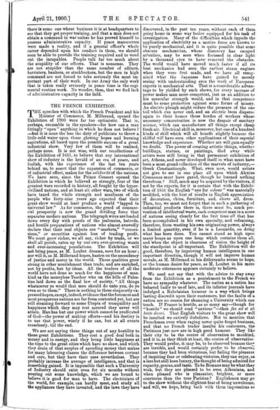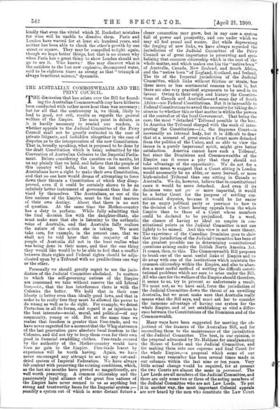THE FRENCH EXHIBITION.
THE speeches with which the French President and his Minister of Commerce, M. Millerand, opened the Exhibition of 1900 were far too optimistic. That is, perhaps, excusable in the speakers—for how can a man fittingly "open "'anything in which he does not believe ? —but it is none the less the duty of publicists to throw a little cold water upon those glowing hopes and burning aspirations, all based upon the possible success of a great industrial show. Very few of them will be realised, perhaps none. It is not wise, with our recollections of the Exhibition of 1851, to believe that any international show of industry is the herald of an era of peace, and foolish, with the experience of the last ten years behind us, to assert that the expansion of commerce, or of industrial effort, makes for the solidariti of the nations. We have seen, since the Prince Consort opened the Exhibition in which he believed so strongly, four of the greatest wars recorded in history, all fought by the hyper- civilised nations, and at least six other wars, two of which have taxed the whole strength and manliness of the people who forty-nine years ago expected that their great show would at least produce a, world "lapped in universal law." As for commerce, the greed of commer- cial prosperity is now the grand dividing force that separates modern nations. The telegraph wires are loaded down every day with proofs of the jealousies, hatreds, and hostile preparations of nations who almost avowedly declare that their real objects are "markets," "conces- sions," or securities against loss of trading profit. We must grow richer, we all say, richer by trade, or we shall all perish, eaten up by our own ever-growing wants and ever-increasing populations. The Exhibition will not bring peace, as M. Loubet dreams, save for an hour ; nor will it, as M. Millerand hopes, hasten on the ascendency of justice and mercy in the world. Those qualities grow strong in other nourishment than trade, and are enriched, not by profits, but by ideas. All the traders of all the world have not done so much for the happiness of man- kind as the moneylese Teacher who on the hills of Pales- tine laid down as the final law of society, "All things whatsoever ye would that men should do unto you, do ye even so to them." There is nothing in these eloquently ex- pressed hopes, except, indeed, evidence that the foremost and most prosperous nations are far from contented yet, but are still straining forward to some Utopia of tranquillity and happiness which they may rest assured they never will attain. Man has but one power which cannot be predicated of God—the power of making efforts—and his destiny is to use that power, wisely if he can, but at all events ceaselessly, till the end.
We are not saying these things out of any hostility to these great Exhibitions. They cost a good deal both in money and in energy, and they bring little happiness at the time to the great cities which have no show, and which they drain of that surplus of spending money that makes formally labouring classes the difference between content and care, but they have their uses nevertheless. They probably increase the average of intelligence, and that is something gained. It is impossible that such a University of Industry should exist, even for six months without pouring out some knowledge, which we are bound to believe it is good for man to have. The electricians of the world, for example, can hardly meet, and study all tie appliances they have invented, and the laws they have discovered, in th past ten years, without each of them going home in- some way better equipped for' his task of investigation. Many of the difficulties which impede the application of electricity as a motive force are known to be purely mechanical, and it is quite possible that some obscure mechanician, whose discovery has escaped attention, may be seen when focussed in clear light' by a, thousand eyes to have removed the obstacles. The world would have moved much faster if all its best Mechanics had seen the earliest steam engines when they were first made, and we have all recog- nised what the Japanese have gained by merely seeing with understanding eyes the work of European experts in mechanical arts. That is a considerable advan- tage to be yielded by such shows, for every increase of power makes man more competent, just as an addition to his muscular strength would, and in that competence must be some protection against some forms of misery. An electric plough might reduce the pressure of the one toil which can never end, and an electric loom disperse again to their homes those hordes of workers whose necessary concentration is now the despair of sanitary science, which can manufacture all things except cheap fresh air. Electrical skill is, moreover, but one of a hundred kinds of skill which will all benefit slightly because the skilful will have seen other applications of their especial knowledge and experience. Whether art will gain equally we doubt. The power of creating artistic things, whether buildings, statues, or paintings, died away while artists were still living in that permanent exhibition of art, Athens, and never developed itself in what must have been a most grand collection of the marvels of industry,— Greek Constantinople. What, even now, would artists not give to see in one place all upon which Alexius Comnenua must have gazed, though he learned nothing therefrom ? Still, much may be acquired by the visitors, if not by the experts. for it is certain that with the Exhibi- tion of 1851 the English "eye for colour" was materially modified, with the best of results in English appreciation of decoration, china, furniture, and, above all, dress. Then, too, we must not forget that in such a gathering of industrial products there is, there must be, much pre- vention of intellectual waste, each competent man in a score of nations seeing clearly for the first time all that has been accomplished in his own specialty, and refraining, therefore, from wasting his own originating power, always a limited quantity, even if he is a Leonardo, on doing what has been done. You cannot stand as high upon many heaps as upon one heap which contains them all, and when the object is clearness of vision the height of the standpoint is all-important. The Exhibition will do good, therefore, by improving human intelligence. in one important direction, though it will not improve human morale, as M. Millerand in his dithyrambs seems to hope, or the human desire for peace, as M. Loubet in his more moderate utterances appears certainly to believe.
We need not say that with the advice to stay away from the Exhibition as a punishment to the French we have no sympathy whatever. The nation as a nation has behaved badly to us of late, and its inferior journals have indulged a Rabelaisian humour in a way which brings lasting discredit upon their customers, but the faults of a nation are no reason for shunning a University which can teach. If France is hostile, as so many say—though for " hostile " we should read "envious "—then fizz est et ab hosts doceri. That English visitors to the great show will be insulted we entirely disbelieve. Not to mention that Frenchmen even when raging never quite forget business, and that no French trader insults his customers, the Parisians just now are in high good humour. They like their city to be the centre of observation to mankind. and. it is, as they think at least, the centre of observatiox. They would prefer, it may be, to be observed because they are terrible, and would certainly prefer to be observe.; because they had been victorious, but failing the pleasure of inspiring fear or celebrating victories, they can enjoy, all a less but still keen luxury, the thought of being admired for capacity, genius, and taste. To be Romans may be what they wish, but they are pleased to be even Athenians, and when pleased who is pleasanter, brighter, or more courteous than the true Parisian ? Englishmen may go to the show without the slightest fear of being unwelcome, and will, we hope, bring back with them impressions so kindly that even the vitriol which M. Rochefort mistakes for wine will be unable to dissolve them. Paris and London have warred for at least six hundred years, and neither has been able to check the other's growth by one street or square. They may be compelled to fight again, though we hope better things, but that is no reason why when Paris has a great thing to show London should not go to see it. Who knows ? She may discover what is the antidote to the last new explosive, decomposed water, said to be eighteen times as strong as that " triumph of always beneficent science," dynamite.



































 Previous page
Previous page